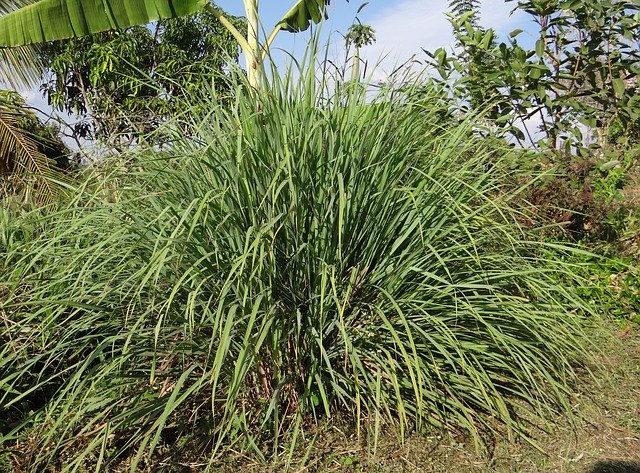Lemongrass essential oil:
What is lemongrass?
Lemongrass is a plant that belongs to the Gramineae family, herbaceous plants from India. Lemongrass essential oil is extracted from the leaves and has a flavour similar to lemon, although more concentrated.
It has a sweet aroma that is often confused with lemon oil, but has very different properties. The former has citral as an active ingredient, a substance responsible for vasodilation. It is also popular for its antifungal properties.

Lemongrass Essential Oil: Properties and Uses
Historically, it has been used as an adjuvant for infections, fever and as a nervous system tranquiliser. But it is also known as a cleansing herb. So some of the known benefits of lemongrass essential oil are to help clean the air when there are environmental threats, in phases of pollution contingency.
As an aid to help lower cholesterol, and promote proper digestive function. It also helps to reduce tension and muscular dystrophy, and mental fatigue.
The compounds that make up lemongrass essential oil are known to have antifungal, insecticidal, antiseptic and anti-inflammatory properties. Lemongrass can prevent the growth of some bacteria and yeasts, and contains antioxidant properties. It also contains substances that are used to relieve muscle pain, reduce fever and stimulate uterine and menstrual flow.
Lemongrass helps us to move forward without hesitation. To take a courageous path of change where we can let go of what we don’t need. Whether it is material or emotional things like feelings and energies that prevent us from growing.
This oil helps people to flow freely and smoothly, to have better analytical skills and greater clarity.
Lemongrass essential oil: Benefits
Lower cholesterol
Research suggests that lemongrass leaf extract lowers cholesterol levels. The rate of cholesterol absorption along your intestinal tract will be reduced. It will help in the process of oxidising negative cholesterol in the blood, effectively stopping the build-up of plaque in the path of your blood vessel walls. In addition, the high amount of potassium present in lemongrass will normalise your blood pressure.
Against diabetes
It was believed that lemongrass can be an ally against diabetes. And indeed, science has proven the blood glucose lowering properties of lemongrass leaf extract.
It relieves aches and pains
Research has found that lemongrass has pain-relieving properties. Some scientists suggest that lemongrass may induce the release of endogenous opioids, substances in the body that regulate pain transmission and therefore determine many of the responses to pain.
Against headache pain

Lemongrass is effective in relieving headache and migraine pain, according to a study by Griffith University in Australia. Darren Grice, head of the study, said that headache pain is related to various changes in brain function. Especially with low serotonin production and lemongrass oil was found to contain eugenol, a substance that reactivates serotonin production.
It is anticarcinogenic
In vitro research suggests that lemongrass extract inhibits the growth of cancer cells. The antioxidant effects of its constituents are thought to account for its potential to exert anti-cancer activity.
Natural deodoriser and cleanser
Use lemongrass oil as a safe, natural air freshener or deodorant. You can add the oil to water and use it as a mist or use an oil diffuser or vaporiser. By adding other essential oils, such as lavender or tea tree oil, you can customise your own natural fragrance.
Hair health
Lemongrass oil can strengthen hair follicles, so if you have problems with hair loss or an itchy, irritated scalp, massage a few drops of lemongrass oil into the scalp for two minutes and then rinse. The soothing and antibacterial properties will leave your hair shiny, fresh and odour-free.
Natural insect repellent
Due to its high citral and geraniol content, lemongrass oil is known to repel insects such as mosquitoes and ants. This natural repellent has a mild smell, and can be sprayed directly onto the skin. You can even use lemongrass oil to kill fleas. Add about five drops of oil to water and create your own spray, then apply the spray to your pet’s fur.
Stomach helper
Lemongrass has been known for centuries anecdotally as a cure for upset stomach, gastritis and gastric ulcers. Now research is catching up with this long-known support and cure.
How to use lemongrass essential oil
If you want to know how to use lemongrass oil, there are several ways you can start using it today:
Aromatically: Can you diffuse lemongrass essential oil? Yes, you can diffuse it throughout your home using an oil diffuser or vaporiser.
Topically: To use lemongrass oil topically. It should be diluted with a carrier oil such as coconut oil in a 1:1 ratio before applying directly to the skin. As it is a potent oil, start very slowly and use several drops at a time. If you’re wondering, how do I use lemongrass oil on my face? Lemongrass oil can sometimes cause skin reactions in people with sensitive skin. Therefore, avoid using it on the face, neck or chest before making sure you react positively by performing a patch test.
Lemongrass essential oil: Precautions
This essential oil is not good for people with low blood pressure, pregnant women and glaucoma patients. As it is a vasodilator, it may increase intraocular pressure. Lemongrass oil should never be applied directly to the skin. It can cause allergies and burns. Experts always recommend using it in a vegetable oil base. A neutral cream or cereal alcohol.




